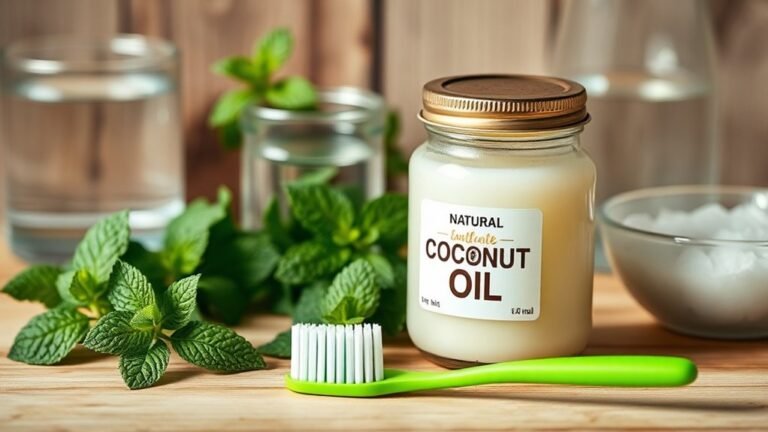Eating a Balanced Diet Strengthens Gum Tissue and Reduces Inflammation
Eating a balanced diet plays a crucial role in strengthening your gum tissue and reducing inflammation. Incorporating essential nutrients like vitamins C and D, calcium, magnesium, and antioxidants enhances gum health. Foods such as fatty fish, leafy greens, berries, and nuts help control inflammation and support immunity. By making healthier dietary choices, you can prevent gum issues and promote overall oral wellness. Discover how you can easily include gum-healthy foods in your daily meals.
Key Takeaways
- A balanced diet rich in antioxidants from fruits and vegetables helps control inflammation and promotes gum health.
- Vitamins C and D, along with calcium and magnesium, are essential for strong gum tissue and immune function.
- Omega-3 fatty acids found in fatty fish aid in gum healing and reduce inflammation.
- Incorporating foods like green tea and turmeric offers anti-inflammatory benefits and supports oral health.
- Regular consumption of crunchy fruits and vegetables can improve gum health by stimulating saliva production and cleaning teeth.
The Connection Between Diet and Gum Health
While you might not realize it, what you eat plays an essential role in your gum health. A balanced diet rich in antioxidants can greatly impact your oral health and help prevent gingivitis. Foods like fruits, vegetables, and whole grains provide essential nutrients that support inflammation control and strengthen gum tissue. Poor dietary choices can lead to increased inflammation, weakening your gum health and making you more susceptible to periodontal disease. Combining a nutritious diet with proper dental hygiene practices, like regular brushing and flossing, creates a powerful defense against gum issues. So, consider how your food choices contribute to healthier gums and overall oral well-being. Prioritize a balanced diet to maintain a vibrant smile and reduce the risk of gum disease.
Essential Nutrients for Strong Gum Tissue
To maintain strong gum tissue, incorporating essential nutrients into your diet is important. Key vitamins like C and D play significant roles in collagen production and immune function, helping reduce gum inflammation. Minerals such as calcium and magnesium support the structural integrity of gum tissue, while zinc aids in healing and combating periodontal disease. Additionally, oral probiotics can promote a healthy balance of bacteria in your mouth, further protecting against gum issues. By focusing on these nutrients, you not only strengthen your gums but also enhance your overall oral health. Remember, a well-balanced diet rich in these vitamins and minerals is your best defense against gum inflammation and related complications.
Foods to Include for Reducing Inflammation
Incorporating specific foods into your diet can greatly help reduce inflammation in your gums. Focus on anti-inflammatory options like fatty fish, which provide omega-3 fatty acids essential for gum healing. Leafy greens, berries, and nuts also support immune health and reduce gum swelling. Foods rich in vitamin C, such as citrus fruits and bell peppers, can combat bleeding gums and improve gum sensitivity. Additionally, turmeric, known for its anti-inflammatory properties, can be a powerful ally in your diet. Green tea, with its antioxidants, offers immune support and may aid in reducing inflammation. By including these foods, you’ll promote healthier gums and potentially alleviate issues related to inflammation.
The Role of Antioxidants in Oral Care
Antioxidants play an essential role in maintaining oral health by neutralizing harmful free radicals that can damage gum tissue and lead to periodontal disease. By incorporating antioxidants into your diet, you can support the oral microbiome, reduce gingival bleeding, and combat gum irritation. These compounds also have antimicrobial properties, helping to prevent gum infections.
| Antioxidant Source | Benefits |
|---|---|
| Berries | Reduce inflammation |
| Green tea | Support gum tissue health |
| Dark chocolate | Combat oxidative stress |
| Spinach | Enhance immune function |
Including natural supplements rich in antioxidants can further enhance your gum health and protect against chronic oral issues. Prioritizing these nutrients will lead to healthier gums and a more vibrant smile.
Tips for Incorporating Gum-Healthy Foods Into Your Diet
How can you easily add gum-healthy foods to your daily meals? Incorporating these foods can support your dental care routine and help reduce gum pain, plaque buildup, and tooth decay. Here are three simple tips:
- Snack Smart: Choose crunchy fruits and vegetables like apples and carrots that stimulate the gingiva while naturally cleaning your teeth.
- Herbal Infusions: Drink herbal teas, such as green tea or chamomile, known for their anti-inflammatory properties and ability to reduce plaque.
- Dairy Power: Incorporate low-fat dairy products, rich in calcium and vitamin D, which strengthen your gums and teeth while fighting against tooth decay.
Frequently Asked Questions
How Long Does It Take to See Improvements in Gum Health?
You might start noticing improvements in gum health within a few weeks of consistent oral care and proper nutrition. However, significant changes can take several months, depending on your individual circumstances and existing gum condition.
Can Supplements Replace a Balanced Diet for Gum Health?
No, supplements can’t replace a balanced diet for gum health. While they can help, whole foods provide essential nutrients that work synergistically, promoting overall health and stronger gums more effectively than any pill ever could.
Are There Foods That Can Worsen Gum Inflammation?
Yes, foods high in sugar, refined carbohydrates, and unhealthy fats can worsen gum inflammation. Processed snacks and sugary beverages promote bacterial growth, leading to plaque buildup and increased inflammation. Focus on healthier options for better gum health.
How Often Should I Visit the Dentist for Gum Issues?
You should visit the dentist every six months for gum issues. Regular check-ups act as a safety net, catching problems early. Consistent care keeps your smile bright and your gum health thriving, preventing future complications.
Can Stress Impact Gum Health Despite a Balanced Diet?
Yes, stress can negatively impact your gum health. It may weaken your immune system, making you more susceptible to gum disease, even if you’re eating well. Managing stress is essential for maintaining overall oral health.
Conclusion
Incorporating a balanced diet rich in essential nutrients can transform your gum health like a superhero boosting its powers. By including anti-inflammatory foods and antioxidants, you not only strengthen your gum tissue but also combat inflammation effectively. Remember, every bite counts towards a healthier smile. So, embrace these dietary changes and watch your gums thrive, as they become the resilient foundation for your overall oral health. Your mouth will thank you for it!






